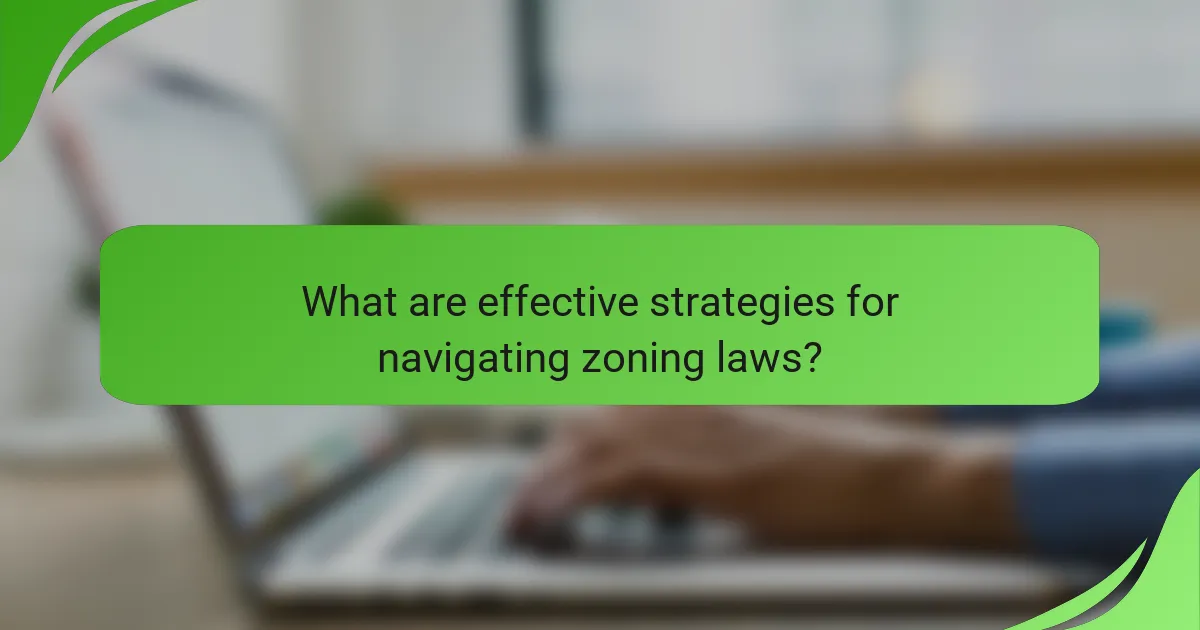Local zoning laws play a crucial role in shaping land use and development within municipalities, ensuring that growth aligns with community objectives and safety standards. While these regulations can create opportunities for property development, they also present challenges such as compliance costs and complex requirements that may hinder project progress. Understanding the intricacies of zoning laws is essential for property owners and developers to navigate potential obstacles effectively.

What are the key requirements of local zoning laws?
Local zoning laws establish regulations that govern land use, building standards, and development processes within a municipality. These laws ensure that land is used in a way that is consistent with community goals and safety standards.
Land use regulations
Land use regulations dictate how properties can be utilized, including residential, commercial, industrial, and agricultural designations. These regulations help maintain the character of neighborhoods and prevent incompatible land uses from coexisting.
Understanding the specific zoning classification for a property is crucial. For example, a residential zone may restrict commercial activities, while a mixed-use zone allows for both residential and commercial developments.
Building codes
Building codes are standards that govern the construction and safety of buildings. These codes cover aspects such as structural integrity, fire safety, and accessibility, ensuring that buildings are safe for occupants.
Compliance with local building codes is mandatory before construction can begin. It is advisable to consult with local authorities or a licensed architect to ensure all plans meet these requirements.
Permitting processes
The permitting process involves obtaining the necessary approvals from local authorities before starting construction or renovation. This process typically includes submitting plans, paying fees, and undergoing inspections.
Each municipality may have different requirements and timelines for permits, so it is essential to check local regulations early in the planning phase to avoid delays.
Setback requirements
Setback requirements specify how far structures must be from property lines or other designated boundaries. These regulations are designed to provide privacy, light, and air between buildings and to ensure safety.
Setback distances can vary significantly based on zoning classifications and local ordinances. For instance, residential zones may require larger setbacks than commercial zones, so it’s important to verify local guidelines.
Density restrictions
Density restrictions limit the number of units that can be built on a given area of land. These regulations help manage population density and ensure that infrastructure can support the number of residents.
For example, a residential area may allow a maximum of 10 units per acre, while a commercial area may have different density allowances. Understanding these limits is vital for developers and property owners to plan appropriately.

How do local zoning laws impact property development?
Local zoning laws significantly influence property development by dictating how land can be used, which can affect project feasibility and profitability. These regulations can create both opportunities and challenges for developers, impacting everything from design to financing.
Influence on property values
Zoning laws can directly affect property values by determining the types of developments allowed in a given area. For instance, residential zones may limit the construction of commercial properties, which can keep property values stable or increase them due to limited supply.
Conversely, if an area is rezoned for higher-density development, property values may rise as demand increases. Developers should consider local zoning regulations when assessing potential investments, as these laws can lead to significant fluctuations in property worth.
Restrictions on land use
Local zoning laws impose restrictions on land use that can limit development options. For example, certain areas may be designated for residential use only, prohibiting commercial or industrial activities. This can affect the types of buildings that can be constructed and the overall character of a neighborhood.
Developers must navigate these restrictions carefully, as violating zoning laws can result in fines or the need to alter plans significantly. Understanding the specific zoning classifications and their implications is crucial for successful property development.
Impact on community planning
Zoning laws play a vital role in community planning by shaping the layout and functionality of neighborhoods. They help ensure that residential, commercial, and industrial areas are appropriately separated, promoting a balanced environment.
Effective zoning can enhance community livability by providing green spaces, reducing traffic congestion, and ensuring access to essential services. Developers should engage with local planning authorities to align their projects with community goals and zoning regulations, fostering positive relationships and smoother project approvals.

What challenges do property owners face with zoning laws?
Property owners often encounter significant challenges with zoning laws, including high compliance costs, complex regulations, and the need for variances or appeals. These obstacles can hinder development projects and increase the time and resources required to navigate local zoning requirements.
Compliance costs
Compliance costs refer to the expenses incurred by property owners to meet zoning regulations. These can include fees for permits, inspections, and legal consultations, which can range from hundreds to thousands of dollars depending on the project size and location.
Additionally, property owners may need to invest in modifications to their properties to comply with zoning standards, such as landscaping or structural changes. Budgeting for these costs is crucial to avoid financial strain during the development process.
Complexity of regulations
The complexity of zoning regulations can be daunting for property owners. Local laws often include various restrictions on land use, building height, density, and setbacks, which can vary significantly from one municipality to another.
Understanding these regulations requires careful review of local zoning codes and possibly consulting with experts. Property owners should be proactive in researching their local zoning laws to ensure compliance and avoid potential legal issues.
Variances and appeals
When property owners find that zoning regulations hinder their plans, they may seek variances or file appeals. A variance allows for exceptions to zoning rules, but obtaining one typically involves a formal application process and public hearings, which can be time-consuming and uncertain.
Property owners should be prepared to present a strong case for why a variance is necessary, including demonstrating how the proposed changes will not negatively impact the surrounding area. Understanding the local process and requirements for variances can significantly improve the chances of approval.

What are effective strategies for navigating zoning laws?
Effective strategies for navigating zoning laws include engaging with local planning boards, consulting zoning attorneys, and utilizing zoning maps. These approaches help individuals and businesses understand regulations, avoid potential pitfalls, and ensure compliance with local ordinances.
Engaging with local planning boards
Engaging with local planning boards is crucial for understanding specific zoning regulations and community goals. Attend public meetings to gain insights into upcoming projects and changes in zoning laws that may affect your property or business.
When interacting with planning boards, prepare questions and be ready to discuss your plans. Building relationships with board members can facilitate smoother approvals and provide valuable feedback on your proposals.
Consulting zoning attorneys
Consulting zoning attorneys can provide expert guidance on complex zoning issues and legal requirements. These professionals can help interpret local laws, assess compliance, and navigate the application process effectively.
When selecting a zoning attorney, look for someone with experience in your locality. They can assist with zoning variances, appeals, and negotiations with local authorities, ensuring that your interests are well-represented.
Utilizing zoning maps
Utilizing zoning maps is essential for understanding land use designations and restrictions in your area. These maps visually represent zoning classifications, helping you identify permitted uses and any limitations on your property.
Access zoning maps through local government websites or planning offices. Familiarize yourself with the key zoning terms and symbols used in your area to make informed decisions about property development or investment.

How can local governments improve zoning regulations?
Local governments can enhance zoning regulations by simplifying processes, fostering community involvement, and revising outdated rules. These improvements can lead to more efficient development, better public satisfaction, and a more adaptable regulatory environment.
Streamlining permitting processes
Streamlining permitting processes involves reducing bureaucracy and expediting approvals for zoning changes and construction projects. Local governments can implement online application systems that allow for quicker submissions and tracking, which can cut down approval times from weeks to days.
Additionally, establishing clear guidelines and checklists for applicants can minimize confusion and ensure that all necessary documentation is submitted upfront. This approach not only speeds up the process but also enhances transparency and predictability for developers and residents alike.
Enhancing community engagement
Enhancing community engagement is crucial for effective zoning regulation. Local governments should actively involve residents in the planning process through public meetings, surveys, and workshops, ensuring that community voices are heard and considered in zoning decisions.
Utilizing digital platforms for feedback can also increase participation, allowing a broader range of residents to express their opinions. Engaging the community helps build trust and can lead to zoning regulations that reflect the needs and desires of the population.
Updating outdated regulations
Updating outdated regulations is essential for addressing current urban challenges and accommodating new development trends. Local governments should regularly review and revise zoning codes to ensure they align with contemporary needs, such as sustainability and mixed-use developments.
Conducting assessments of existing regulations can identify areas that require modernization, such as minimum lot sizes or parking requirements. By adapting these rules, local governments can promote more efficient land use and better respond to the evolving dynamics of their communities.

What are the emerging trends in zoning laws?
Emerging trends in zoning laws reflect a shift towards flexibility and sustainability in urban planning. Increasingly, municipalities are adopting mixed-use developments, allowing for residential, commercial, and recreational spaces to coexist, which promotes community engagement and reduces reliance on transportation.
Increased Focus on Sustainability
Many local governments are incorporating sustainability into zoning regulations to address climate change. This includes promoting green building practices, enhancing public transportation access, and preserving open spaces. For example, cities may require new developments to meet certain environmental standards or include green roofs.
Additionally, zoning laws are evolving to support renewable energy initiatives, such as allowing solar panels on residential properties without extensive permitting processes. This trend encourages homeowners to invest in clean energy solutions, contributing to broader environmental goals.
Mixed-Use Developments
Mixed-use developments are becoming increasingly popular as they create vibrant neighborhoods where people can live, work, and play. Zoning laws are adapting to facilitate these projects, often allowing for a blend of residential, commercial, and recreational spaces within the same area.
For instance, a new zoning ordinance might permit a residential building to include ground-floor retail spaces, encouraging foot traffic and local business growth. This approach not only enhances community interaction but also reduces the need for long commutes, benefiting both residents and the environment.
Smart Growth Principles
Smart growth principles are gaining traction in zoning laws, emphasizing efficient land use and infrastructure development. These principles aim to curb urban sprawl by promoting higher-density developments in existing urban areas.
Local governments may implement zoning changes that incentivize developers to build multi-family housing near public transit hubs. This strategy can lead to more affordable housing options and improved access to essential services, fostering a more sustainable urban environment.
Community Engagement in Zoning Decisions
There is a growing emphasis on community engagement in zoning decisions, allowing residents to have a voice in shaping their neighborhoods. Many municipalities are hosting public forums and workshops to gather input on proposed zoning changes.
This participatory approach not only builds trust between local governments and residents but also ensures that zoning regulations reflect the needs and desires of the community. Engaging citizens can lead to more effective and accepted zoning policies that enhance local quality of life.
